Carolina's Fashion Forward initiative revolutionizes fashion education through strategic industry integration. Within RMIT's Bachelor of Fashion (Enterprise) program, Carolina has crafted a progressive three-year journey that seamlessly connects classroom theory with industry practice and career development, creating exceptional outcomes for all stakeholders. Despite being a relatively small Bachelor Degree with just 500+ students, this initiative is making outsized contributions to the $1.7 trillion global fashion industry. The initiative's relevance lies in its scaffolded progression: first-year students engage with textile laboratories and industry speakers; second-years tackle commercial briefs from Caprice Australia; and third-years develop technical collections with regulatory requirements, culminating in "shark tank" presentations to industry executives. Throughout, Carolina integrates structured Career Development Learning that builds students' professional identities and career agency. This approach centers sustainability as a core principle, teaching students to address fashion's environmental challenges through innovative business models, circular design thinking, and ethical supply chain management. Students learn to balance commercial viability with environmental responsibility and innovation, preparing them to lead the industry's necessary transformation. The impact is important for the fashion industry: significant internships secured, numerous pre-graduation employment offers, and exceptional student satisfaction scores. Industry validation comes from partners like Caprice Australia, who note that student projects are "very commercial and could easily go to the floor of one of our retail partners." Most impressively, the Le Specs 'Le Siren' sustainable collection, developed by students through Carolina's program, was produced commercially and "requested by Justin Bieber's team". The initiative has evolved into the annual Fashion Enterprise and Technology Day, featuring industry leaders delivering specialized courses, structured networking for employment opportunities, and knowledge exchange on emerging industry challenges. This event represents a self-sustaining ecosystem generating ongoing value for all participants. This work has earned significant recognition, including the 2024 Australian Awards for University Teaching (Citation for Outstanding Contribution to Student Learning), 2022 RMIT Award for Excellence (Citation for Outstanding Contribution to Student Learning), selection as a finalist in the Australian Financial Review Higher Education Awards (Teaching & Learning Excellence Award), and acceptance as a case study by the Australian Collaborative Education Network. https://www.rmit.edu.au/about/schools-colleges/fashion-and-textiles/industry-partnered-learning

CATEGORY WINNER
Engaged Academic of the Year Award
Carolina Quintero Rodriguez
CATEGORY WINNER Engaged Academic of the Year Award
RMIT University - Australia
"Transforming fashion education through student agency and authentic industry partnerships"
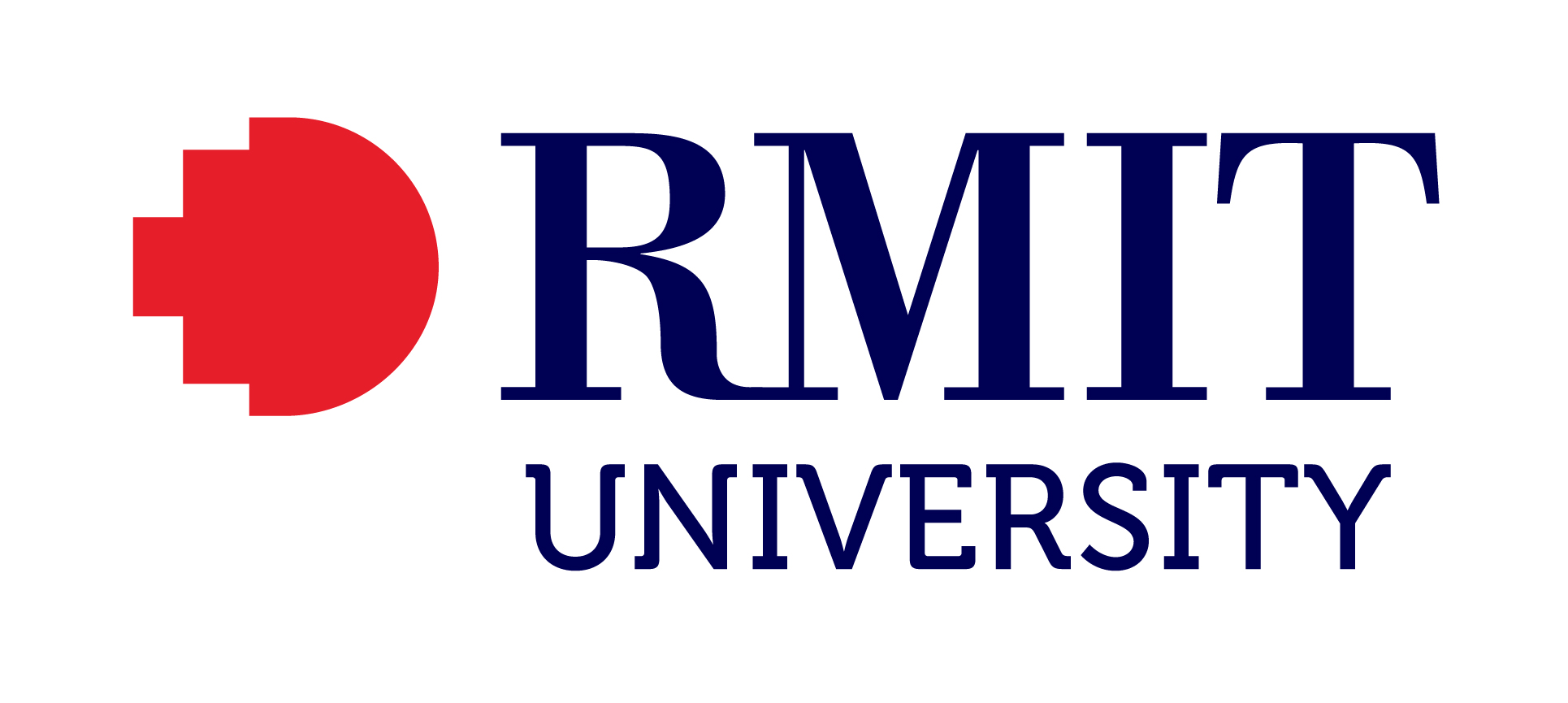
Engage on social media
(Applicant's LinkedIn )
(Video of the initiative_Fashion Forward: Education through Industry Integration)
(Video: Testimonial from Industry_CEO Caprice Australia )
(Video: Testimonial from Industry_Sustainability Manager)
(Official RMIT YouTube account )
(Official RMIT Instagram account )
(Official RMIT LinkedIn account )
(Official RMIT Facebook account)
Have a say and vote for this entry to win the People's Choice Award!
500 points per vote
Provide your email address and click on "vote". You will then receive an email that enables you to verify your vote by clicking on a link.
1500 points for each share/re-post; 500 points for each like
This entry has not provided any social media links for community voting.
Summary
Key People
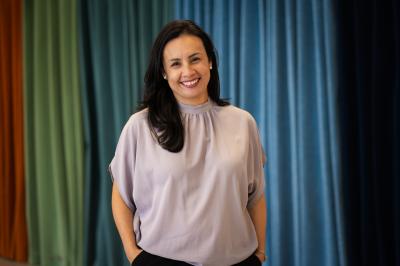
Dr Carolina Quintero Rodriguez
Manager of the Bachelor of Fashion (Enterprise) Program
School of Fashion and Textiles,
RMIT University
Acknowledgements
Carolina would like to warmly acknowledge the invaluable support of Associate Professor Tarun Panwar, Associate Dean of Enterprise and Technology, for his ongoing encouragement and trust in the development of this initiative. His belief in the vision has been instrumental in bringing it to life.
Deep appreciation is also extended to the Careers and Employability team, particularly Dr Anna Branford, whose expertise and collaboration have been central to the success of the Career Development Learning components. Her thoughtful creation of tailored learning materials and generous support in providing access to impact data have significantly strengthened the depth and evidence of the program's outcomes.
Images
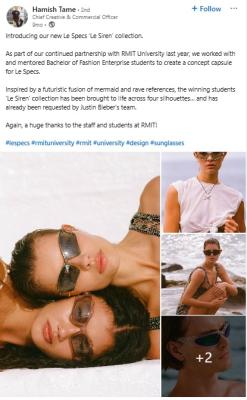
Industry Partner LinkedIn Post_Release of Collection Created by RMIT students
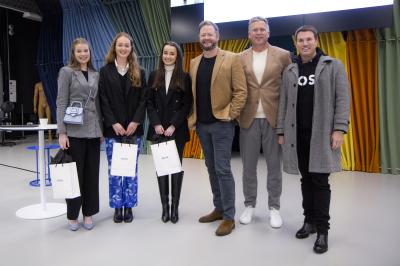
Winning Student Team Recognised by Industry Partner_Hugo Boss
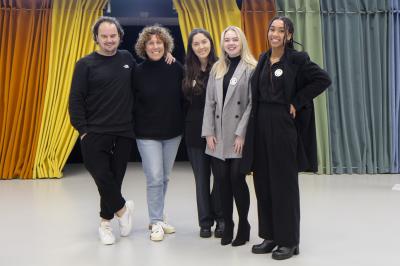
Winning Student Team Recognised by Industry Partner_Le Specs
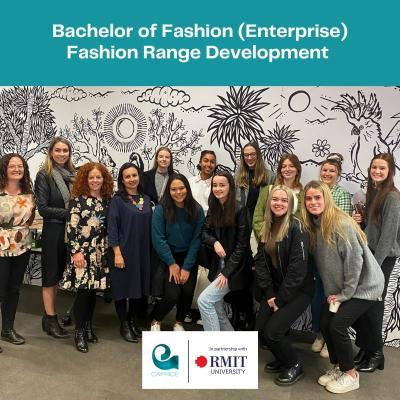
Students Presenting at Industry Partner's Head Office_Caprice Australia
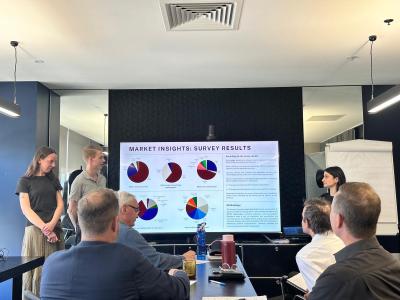
Students Presenting at Industry Partner's Head Office_Hugo Boss
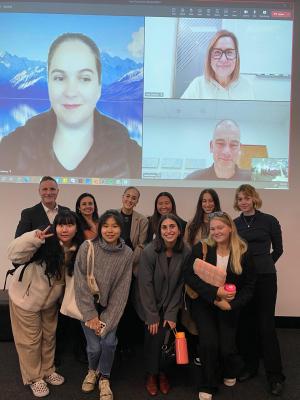
Students Presenting to Industry Partner_Macpac New Zealand
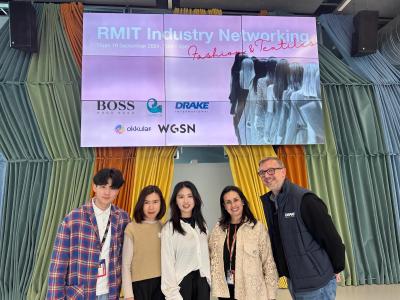
Fashion Enterprise and Techology Day_Networking Event
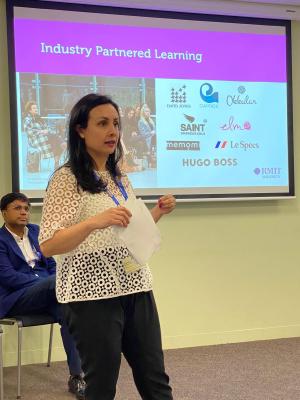
Presenting the Initiative at RMIT's Learning and Teaching Festival
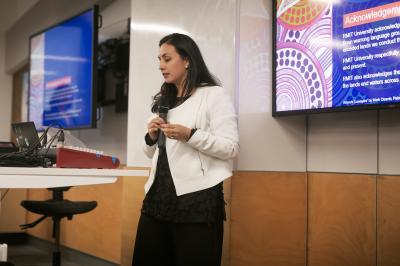
Presenting the Initiative at ACEN Conference
IMPACT STORY
Impacting lifes
In 2023, final-year students in RMIT’s Fashion Enterprise Partnered Project course were given a challenge by iconic eyewear brand Le Specs: design a concept capsule that fused creative vision with commercial appeal. With guidance from industry mentors, students delivered bold, thoughtful responses, learning to balance aesthetics, sustainability, and real-world commercial constraints.
The result? Le Siren: a collection inspired by a futuristic fusion of mermaid and rave culture. Le Specs was so impressed, they released the collection commercially and proudly shared it on social media: “Introducing our new Le Specs ‘Le Siren’ collection... The winning students’ collection has already been requested by Justin Bieber’s team".
This is just one example of the transformative work happening. Across three years, RMIT’s Product Development stream embeds Career Development Learning, helping students identify, reflect on, and articulate their evolving professional identities. They complete skills audits, SWOT analyses, and develop portfolios that prepare them not just to graduate, but to truly compete.
Students feel the difference. One reflected, “The best part of this course is having industry opportunities and making work I can use in a job interview". Another shared, “I am confident that I have demonstrated strong initiative and adopted a leadership role in team settings… which has benefited in achieving a high standard of work”.
Data collected across the university clearly shows how this approach is helping students feel more prepared for their future careers. In 2021, 3% of the students in this program felt fully ready to compete for jobs in the fashion industry. By 2024, almost one in five students (18%) reported feeling confident and fully prepared to enter the job market.
At the same time, the number of students who felt clear about their career direction and ready to take the next step (being ‘sorted’) also grew significantly. In 2021, less than 4% of students felt this way. By 2024, that number had increased to nearly 16%.
Industry partners also feel the impact. Caprice Australia’s CEO noted: “We are always blown away by the standard of both their presentation skills and the projects and ranges".
Carolina’s work is more than teaching: students gain technical skills and discover who they are, how they work best, and what kind of future they want to shape. Through the initiative, students leave as confident, career-ready professionals, prepared for the industry and the future.
LEARNINGS
Lessons learned
One of the most powerful learnings from this journey has been the impact of cognitive dissonance in student learning: how placing students in real-world, high-stakes situations, often outside their comfort zone, can trigger deep transformation. Students who once questioned their place in the fashion industry have found clarity and confidence after presenting to brands like Hugo Boss or seeing their designs brought to life commercially by Le Specs. These authentic engagements foster not only technical skills but a strong sense of professional identity.
Another unexpected insight is how eager industry partners are to collaborate because they genuinely see value in co-creating with students. What began as classroom engagement has evolved into meaningful, ongoing partnerships where industry co-develops briefs, shapes learning materials, and even funds research. These collaborations grow because of mutual benefit.
A key takeaway is that industry-engaged education doesn’t require large budgets: it requires demand intention, structure, and care. Every project, from first-year labs to final-year capstones, is scaffolded to build students’ technical skills and career confidence. Career Development Learning is embedded at every step through reflective practice, skills audits, and interview preparation, helping students recognise and articulate their growth.
For those considering a similar path, the advice is simple: start with empathy, understand the students’ needs and fears, and build meaningful connections to industry. Remain open to reflection and feedback: it’s through this openness that real innovation, and transformation can thrive.
FUTURE PLANS
What's coming?
Carolina’s vision is to strengthen the connection between industry, education, research, and social impact, expanding the reach of fashion education to prepare students for employment and empower them to shape the future of the industry.
The next step is the development of a digital portfolio platform to help students curate and reflect on their learning journeys, from first year through to graduation across all areas of knowledge. This will support them in visualising their growth in meaningful ways.
Carolina is also co-developing an alumni podcast series with graduates who have transitioned into industry roles, many of whom began through internships facilitated by the program. These stories will create a valuable feedback loop of mentorship and inspiration, giving current students insights into real-world pathways and the lasting impact of their education.
At the course level, the initiative aims to expand the sustainability focus of partnered projects by creating new briefs with industry that address ethical sourcing, circular design, and innovation. These will be mapped against the UN Sustainable Development Goals, offering students fresh challenges alongside companies that share these values.
Work will also continue with external university’s to extend this model into other disciplines, further strengthening the bridge between academic learning and practical, real-world outcomes.
Finally, the initiative seeks to expand its global footprint, with growing interest from international partners in developing projects that foster cross-cultural design and innovation while addressing shared global challenges.
At the heart of Carolina’s future plans is a commitment to meaningful, future-focused education that equips students with the confidence, skills, and voice to lead in an evolving industry.

